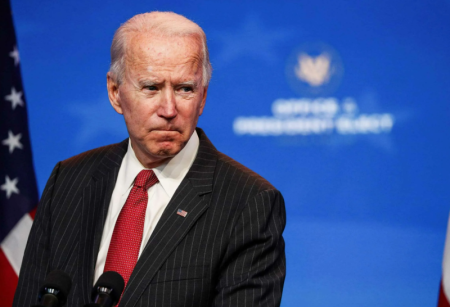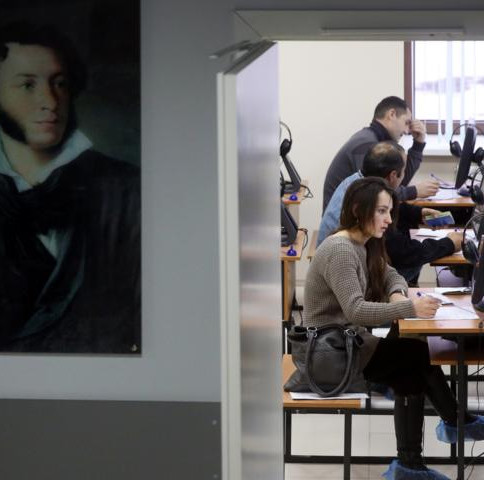
US President Joe Biden backs Republican aid packages for Ukraine, Israel; the West can’t seem to find a way to seize frozen Russian assets; and India’s general election is unlikely to affect the country’s relations with Moscow. These stories topped Friday’s newspaper headlines across Russia, according to TASS News Agency.
Vedomosti: Biden backs Republican aid packages for Ukraine, Israel
US President Joe Biden has endorsed the package of initiatives to provide aid to Ukraine, Israel and Taiwan. The bills, introduced by speaker Mike Johnson, will now go to the House for consideration on April 20, Vedomosti notes.
The Ukraine bill proposes giving $60.75 bln to Kiev. Within two months of the bill becoming law, Biden must negotiate with Kiev about how Ukraine will pay back the economic assistance. Additionally, the US will be able to send Army Tactical Missile Systems (ATACMS) to Ukraine, which are capable of hitting targets up to 300 km away, provided this will not harm the national interests of the United States.
Biden’s support of the Ukraine bill is due first and foremost to the dire situation Kiev is facing on the frontline, Dmitry Suslov, deputy director of the Center for Comprehensive European and International Studies at the Higher School of Economics, pointed out. Add to that the fact that the Republican bill is not much different from what the Democratic administration was after and the party has a political victory on its hands, a bipartisan triumph for its policy of providing aid to Kiev.
The bill only mentions minimum amounts, Alexander Yermakov, a military expert with the Russian International Affairs Council, noted. In particular, next year’s base defense budget did not allocate much money for ammunition and the expansion of missile production, so the Pentagon initially expected to include these expenses in a separate bill. Direct military assistance to Ukraine will total about $13.8 bln. As a result, once the bill is passed, the US will be able to return to the "normal" level of weapons supplies to the Ukrainian armed forces, while Kiev will have to stretch the aid it is currently receiving at least until the end of this year, Yermakov noted. Under the circumstances, another Ukrainian counteroffensive is out of the question.
US weapons supplies will see an uptick but not a big one, certainly not enough to change the balance of power on the frontline, Prokhor Tebin, director of the Military and Economic Research Center at the Higher School of Economics’ Institute of World Military Economy and Strategy, emphasized.
Izvestia: West struggles to find legal avenue to take Russian assets
Western countries have stepped up efforts to create a legal framework to "legitimately" steal Russia’s rightful assets. Finance ministers and central bank chiefs from G7 nations announced following their April 17 meeting that they were still trying to figure out a way to use this money to support Ukraine. Meanwhile, US lawmakers will consider a bill on April 20 that would allow the president to seize Russian assets, Izvestia writes.
Experts believe that no agreement on a seizure mechanism should be expected any time soon. "No G7 country except Canada currently has a legal mechanism allowing it to seize Russia’s frozen state property and hand it over to Ukraine," Russian International Affairs Council Director General Ivan Timofeev explained. "Still, there are certain elements of such mechanisms. The European Union is discussing a tool to take the profits from Russia’s sovereign assets and send the money to Ukraine. However, there is currently no mechanism to seize frozen government property. In order to do that, the EU will have to make changes to a number of fundamental documents and the constitutions of some countries. The EU is not ready to do this. The US has no such tool either because Washington is worried about the impact it could have on its investment ratings," the expert added.
The debate about the need to use Russian assets to support Kiev is heating up inside the EU considering the US Congress has still not approved a new aid package for Ukraine. Amid criticism of the delay, the US put forward some bills on Ukraine assistance, which particularly address the use of Russian assets. The plan includes legislation to allow the US president to fully or partially seize sovereign Russian assets under US jurisdiction in order to transfer them to a Ukraine support fund that is expected to be established.
"Such bills keep coming. However, not every initiative is approved," Timofeev pointed out. "Over a hundred bills related to sanctions on Russia have been initiated over the past four years, and even more documents concerning China. Notably, only five percent of sanctions bills are passed," he said.
Media: What India's election means for relations with Russia
India’s most significant election in recent memory has begun. The ruling Bharatiya Janata Party, led by Prime Minister Narendra Modi, is considered the favorite. Modi is poised to secure a third consecutive term in office. Post-election, Western countries may try to strengthen ties with India, recognizing it as China’s main rival in the region. Experts interviewed by Izvestia believe that New Delhi’s relations with Moscow will not change.
India’s global ascent would be welcomed by the West given the rivalry between India and China. However, India’s growing power may pose a challenge for the West in many issues of global politics, Professor Ajay Dubey of New Delhi’s Jawaharlal Nehru University told the paper.
The strengthening of India’s ties with Western powers will not come at the expense of its relations with Russia, Rakesh Bhadauria, head of the Center for Strategic Studies and Simulation at the United Service Institution of India, pointed out. According to him, the Indian-Russian relationship remains strong based on diplomatic support. In particular, New Delhi always relies on Moscow’s support in the UN Security Council. Besides, India has complicated relations with China, so Russia, who maintains close partnership with Beijing, acts as a kind of a buffer between the parties.
India remains dependent on Russian weapons supplies, while Russia needs India to continue purchasing oil. Modi has good relations with the Russian leadership. With dramatic global events such as potential war between Israel and Iran left out, continuity in Indian-Russian relations is likely to be preserved, Atul Kohli, professor of Politics and International Affairs at Princeton University, stressed.
Gleb Makarevich, researcher with the Center of the Indo-Pacific Region at the Russian Academy of Sciences’ Institute of World Economy, told Vedomosti that if Modi is re-elected, India will continue to build partner relations with Russia. "As a rule, Indian governments have good relations with Moscow and Modi is no exception here," he said.
Rossiyskaya Gazeta: Gold prices may hit all-time high amid global tensions
Gold prices may reach an all-time high of $3,000 per troy ounce, Citigroup analysts said. Currently, it is trading at $2,391. Experts interviewed by Rossiyskaya Gazeta believe that gold prices are being driven by global geopolitical tensions, the weakening US dollar and investors looking for "a safe haven."
"Gold prices may well reach the $3,000 per ounce mark within six to eighteen months. There are many reasons behind this growth, both economic and political ones," Mikhail Gordiyenko, associate professor with the Department of Sustainable Development Finance at the Plekhanov Russian University of Economics, noted.
According to him, on the economic front, the downturn of the US financial system is at the center, namely the huge increase in the national debt and the expectation that the Fed will change its monetary policy as a result. A possible weakening of the dollar is causing investors to put money into real assets, which is pushing up prices for oil, cocoa and other commodities, including gold.
Tensions in the Middle East are another important factor that has caused this big increase in gold prices. "It remains to be seen which of these factors will become a trigger but one thing is clear: gold has been and will continue to be a stabilizing asset in times of instability," the expert stressed.
Finam analyst Nikolay Dudchenko sees demand for the precious metal from central banks as another significant factor pushing gold prices up. "According to the latest report from the World Gold Council (WGC), central banks increased investment in gold in February. The net purchases of gold amounted to 19 tons. The WGC believes that demand from global regulators is one of the key reasons behind this year’s shortage of gold on the market," the expert explained.
Rossiyskaya Gazeta: Gas prices on the rise again in Asia, Europe
Liquefied natural gas (LNG) prices in Asia have risen by 40% since late February, soaring above $400 per 1,000 cubic meters, the highest this year. As a result, many short-term LNG suppliers are beginning to prioritize the Asian market, Rossiyskaya Gazeta writes.
Tensions in the Middle East are contributing to the rise in prices. Rystad Energy analysts say that if the situation escalates further and Iran blocks the Strait of Hormuz, a conduit for about 20% of global annual LNG trade, gas prices may exceed the $3,600 per 1,000 cubic meters mark, reaching the record levels of 2022. However, the possibility of this happening is seen as low.
For Russia, a rise in global gas prices is a good thing. Domestic gas tariffs aren’t related to global prices, while most of the country’s LNG is exported. Meanwhile, rising prices in Asia are causing a reaction in Europe. Alexey Grivach, deputy head of the National Energy Security Fund, points out that Europe’s gas prices currently stand at about $350 per 1,000 cubic meters, which is 1.5 to 2 times higher than in February and March.
The rise in prices on the Asian market is certainly driving prices in Europe but it’s important to note that this largely stems from concerns about a potential escalation of the conflict in the Middle East, Ivan Timonin, project manager at the Implementa company, said. In fact, there are no shortages on the market at the moment and Europe and Asia are unlikely to engage in tougher competition for the available volumes of gas.
Experts believe that Russia will not redirect its LNG exports to the Asian market. According to Grivach, in the time of year when ships cannot navigate the Northern Sea Route, it’s easier to deliver LNG from the Arctic to Europe. Besides, most of Russian LNG exports are based on long-term contracts and the geographical sales structure is unlikely to change significantly, Timonin added.
TASS is not responsible for the material quoted in these press reviews









